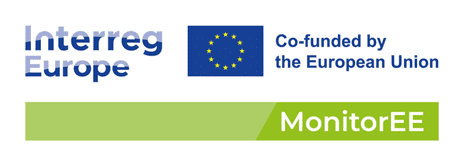MonitorEE: enhancing monitoring energy efficiency in buildings
Context
Building industry is one of the biggest energy consumers. In Europe, this field represents 40% of energy consumptions and 36% of greenhouse gaz emissions. In France, it respectively represents 43% and 23%.
40 %
In Europe, building industry represents 40% of energy consumptions.
In 2019, the European Union implemented the European Green Deal, provided with a budget of 17,5 billions of euros to start a ecological and fair transition with the aim to reach climate neutrality in 2050. This deal is based on several texts and European directives :
- Renovation Wave Strategy which aims at doubling the volume of energy retrofits in 2030
- Fit for 55 is a text which obliges European member states to dicrease their greenhouse gaz emissions in 2030 to reach climate neutrality in 2050
- Directive 2018/844 on energy efficiency of buildings
- Directive 2012/27 on energy efficiency
Consequently, there is a real challenge for the European building industry. To reach the fixed objectives, it is necessary to develop a strategy fitting to the different regional contexts, taking into account technical, financial and administrative issues to retrofit buildings in the long term.
Local authorities have a key role, notably to compel investments which will increase energy efficiency and therefore to decrease energy consumptions and environmental impact.
The MonitorEE project
As a project part of the financing Interreg Europe programme, MonitorEE, highlights cooperation and the sharing of good practices between partners.
MonitorEE started on the 1st March 2023 and will end on 28th February 2026. The allocated budget is 1.12 million euros and it is co-financed at 80% by the European Union.
MonitorEE, Improving energy efficiency through smarter management systems), aims at improving regional authorities’ strategies with the implementation of digital tools to evaluate and monitor the real energy efficiency of buildings after retrofit.
Objectives
- Sharing good practices related to monitoring and energy efficiency.
- Developping a monitoring methodology fitting with the different regional contexts.
- Contributing to the evolution of public policy tools and to the acceleration of retrofits to reduce energy consumptions and greenhouse gaz emissions.
Expected results
The developped methodology and the sharing of good practices are supposed to help each partner to improve its public policies in the field of energy retrofit. In Paris, we aim first at implementing the methodology in our internal tool called CoachCopro, as a simplified energy assessment and second at contributing to the right evolution of public policies.
Partenaires
- Consortium Extremadura Energy Agency, AGENEX (Spain)
- South-West Oltenia Regional Development Agency (Romania)
- Marshal’s Office of the Mazowieckie Voivodeship (Poland)
- Environmental Protection and Energy Efficiency Fund (Croatia)
- Lappeerenta Municipality (Finland)
- Paris Climate Agency (France)
